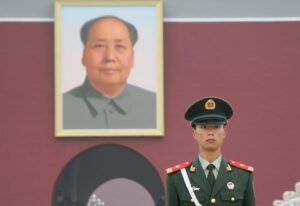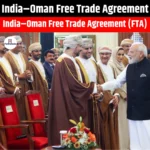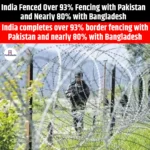China Expels Top Military Rank Officials Over Corruption Allegations
|
General Studies Paper II: India and its Neighbourhood, Effect of Policies & Politics of Countries on India’s Interests |
Why in News?
The Chinese Communist Party expelled nine top-ranking military officials in October 2025 after serious corruption allegations. The move reflects President Xi Jinping’s ongoing anti-graft campaign targeting the defense sector.

Details of the Recent Expulsions
In October 2025, China intensified its anti-corruption campaign by expelling nine senior military officials, including two top generals, from the Communist Party and the People’s Liberation Army (PLA).
- He Weidong: He Weidong, the second-highest-ranking officer in the PLA and a member of the Politburo, was expelled for serious violations of discipline and law. He served as Vice Chairman of the Central Military Commission and he had longstanding ties to Xi Jinping, dating back to their service in Fujian Province. He was a central figure in Taiwan-related military planning.
- Miao Hua: Admiral Miao Hua, the former Navi Admiral and top political officer of the PLA, had been under investigation since November 2024. He was suspended from his duties and later expelled from the Communist Party and the PLA for serious violations of discipline and law.
- He Hongjun: General He Hongjun, who served as Deputy Head of the Political Work Department of the Central Military Commission, was expelled following investigations into serious misconduct.
- Qin Shutong: General Qin Shutong, who held the position of Political Commissar of the PLA Ground Force until December 2024, was expelled for serious violations of discipline and law.
- Wang Chunning: General Wang Chunning, who served as Commander of the People’s Armed Police until July 2025, was expelled for serious violations of discipline and law.
- Wang Xiubin: General Wang Xiubin, who commanded the Southern Theater Command until July 2024, was expelled for serious violations of discipline and law.
- Lin Xiangyang: General Lin Xiangyang was an Eastern Theatre commander. He was expelled for serious violations of discipline and law.
- Yuan Huazhi: General Yuan Huazhi, another former deputy in the Navy’s political commission, was expelled for serious violations of discipline and law.
- Wang Chunning: General Wang Chunning, who also held a deputy position in the Armed Police Force command, was expelled for serious violations of discipline and law.
Background of China’s Military Anti-Corruption Campaign
- China’s military anti-corruption campaign, initiated in 2012 under President Xi Jinping, has intensified over the years, particularly since 2023.
- The campaign aims to eliminate corruption within the People’s Liberation Army (PLA) and associated defense sectors.
- The focus has been on high-ranking officials suspected of serious misconduct, including bribery, embezzlement, and abuse of power.
- This initiative reflects Xi Jinping’s broader strategy to consolidate power and maintain international credibility of the military to the Communist Party.
- The primary goals of the campaign are to ensure discipline, loyalty, and efficiency in the Chinese military.
- Before 2025, China had already removed several senior officials under this program. Notably, Vice Admiral Li Hanjun, Chief of Staff of the Navy, was dismissed due to corruption allegations.
- Also Liu Shipeng, Deputy Chief Engineer at China National Nuclear Corporation was removed. He was accused of financial irregularities that affected strategic operations.
- In 2024, Defense Minister Dong Jun came under investigation for corruption. This case demonstrated that the campaign extended beyond lower and mid-level officers. Earlier, two former defense ministers, Li Shangfu and Wei Fenghe, had also been dismissed for similar reasons.
China’s Military and Its Significance
- The People’s Liberation Army (PLA) is China’s principal military force. It was established on August 1, 1927, during the Nanchang Uprising.
- The PLA operates under the control of the Communist Party of China rather than the state.
- It consists of five main branches: the Ground Force, Navy, Air Force, Rocket Force, and Strategic Support Force.
- By 2025, the PLA has grown into one of the largest military organizations in the world with over 2 million active personnel.
- The PLA plays a central role in China’s national security. It protects land borders, maritime claims, and airspace. China shares borders with 14 countries, including India, Russia, and North Korea.
- Since the 1990s, China has focused on modernizing its military. Investments in missile technology, naval vessels, cyber warfare, and space capabilities have increased. By 2025, China is estimated to have around 500 nuclear warheads.
- By 2024, China had developed advanced stealth fighters such as the J-20 and nuclear-powered submarines to create a force capable of projecting power in the Asia-Pacific region.
- The PLA Navy conducts regular patrols in the South China Sea, East China Sea, and Indian Ocean. In 2023, the PLA conducted joint exercises with Russia and Pakistan, signaling its growing role in international defense diplomacy.
|
Chinese Communist Party (CCP)
|
|
Also Read: China Victory Day Parade 2025 |









